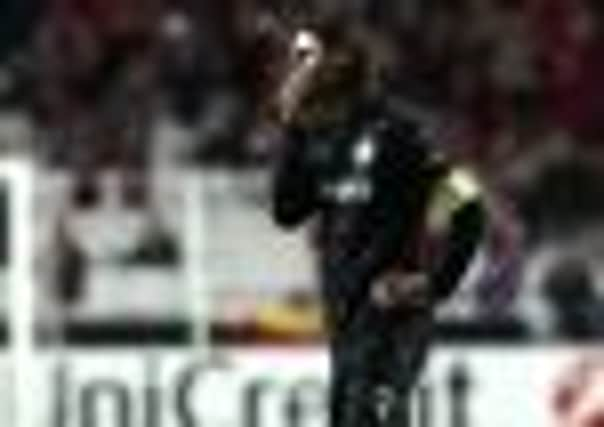Glenn Gibbons: Lisbon is Lourdes reversed for Celtic


Nobody could argue with those supporters’ entitlement to regard the Portuguese capital as a place of devotion without running the risk of attracting a certain ridicule. It is, after all, the site of the club’s crowning achievement, the celebrated European Cup triumph.
But the history of the 45 years since indicates that the events of that May day in 1967 triggered not only an orgy of intoxication, but a hoodoo that has yet to be laid. The latest visit, on Champions League duty on Tuesday, yielded more pain in the form of a 2-1 defeat by Benfica.
Advertisement
Hide AdAdvertisement
Hide AdIt also extended to six the succession of punishing pilgrimages made by the fans, an uninterrupted sequence of misery that began in 1969 with their first return to the city after the European conquest.
And those who take the view that Celtic’s performance in this week’s defeat was not a very pretty sight should know that it was, on balance, probably the most encouraging they have delivered in that town over the past four decades. Those previous five trips not only all ended in defeat, but the Glasgow side could not boast so much as a single goal.
Their aggregate rout from the six matches now stands at 13-1, having previously lost 3-0, 3-0 and 1-0 to Benfica and 2-0 on each of the two occasion on which they met the latter’s city neighbours, Sporting. But none has come anywhere near to being as incident-laden, bizarre and, on reflection, as surreal as the first link in that chain of pain, the showdown with Benfica 43 years ago this month.
This now creaking columnist would not have required the head-spinning events of that impossible night to make it memorable, as he was then a naïve, slightly dazzled, but (probably insufferably) enthusiastic novice football reporter on his first foreign assignment. No beginner could have fantasised a more eccentric debut.
Having won the first leg of the second-round tie 3-0 at Celtic Park, the Scottish champions travelled to Lisbon so confident of progressing that one of the players, with whom I had become friendly, asked me to have £50 on Celtic with another friend, Glasgow bookmaker Tony Queen, who travelled everywhere with the team. “We’ll beat them again over here,” said the player, although his self-belief might have deflated had he witnessed the readiness with which Tony accepted the half-century. As Jock Stein’s closest pal, the odds layer was well aware of the certainty that Benfica on their own pitch could be ferocious.
That proved to be an understatement. The peerless Eusebio headed the home side ahead near half-time, but not so close to the interval as to prevent his teammate, Graca, from adding a second before the whistle blew. But, having survived the kind of second-half onslaught that inspired the film Zulu, Celtic’s heroic goalkeeper, John Fallon, was beaten by the substitute, Diamentino, so deep into stoppage time that the Dutch referee, Laurens van Ravens, was signalling the end of the match as the ball crossed the line.
With home fans spilling on to the pitch to celebrate, van Ravens, astonishingly, took the teams off, with nobody but him knowing whether or not the equaliser was valid. Word came back later that the goal was good and extra time would be played. With no further goals, the game would be decided - it seems impossible to believe nowadays - on the toss of a coin. Once again, van Ravens took the teams off the field and the two captains, Billy McNeill and Mario Coluna, went to the official’s room for the decisive call. McNeill was asked to shout first, and danced when he correctly nominated heads. But the referee then told him that toss was to decide who should call for the match. He said heads again and the coin landed on its rim and rolled towards a corner, with players, match officials and a handful of journalists all in pursuit.
It was some time before confirmation of Celtic’s progress arrived above ground and, with the kick-off having been 9.45 and the referee’s unfathomable antics in the late stages, it was a match that began on a Wednesday and finished on a Thursday. By comparison, this week’s caper was just another routine setback in the city of broken dreams.
Impetuous Chelsea board could have done for Stein
Advertisement
Hide AdAdvertisement
Hide AdFEW would give credence to the thought that Celtic could have anything in common with Chelsea, but the London club’s threatened elimination from the Champions League recalls the Parkhead side’s bitter experience as holders of the European Cup in the autumn of ‘67.
It was their misfortune to be drawn in the opening round against Dinamo Kiev, the formidable Ukrainian
team (then representing the Soviet Union) and then to give their worst performance so far under Jock Stein in the first leg in Glasgow. The 2-0 home defeat was followed by a 1-1 draw in Kiev, where they led despite Bobby Murdoch’s ordering-off and conceded an equaliser only in the 90th minute.
The equivalent of a first-round departure for the reigning champions nowadays is failure to get past the group stage, which will be the fate of Chelsea in Group E if Juventus avoid defeat against Shakhtar Donetsk in the last match. Any similarity between the two European champions, however, ends there.
Even if credited with the appointment of Stein, the Celtic board back in ‘67 would not have occupied a lofty position in the fans’ estimation, but at least those directors had enough sense not to consider big Jock’s Kiev misadventure worthy of instant dismissal.